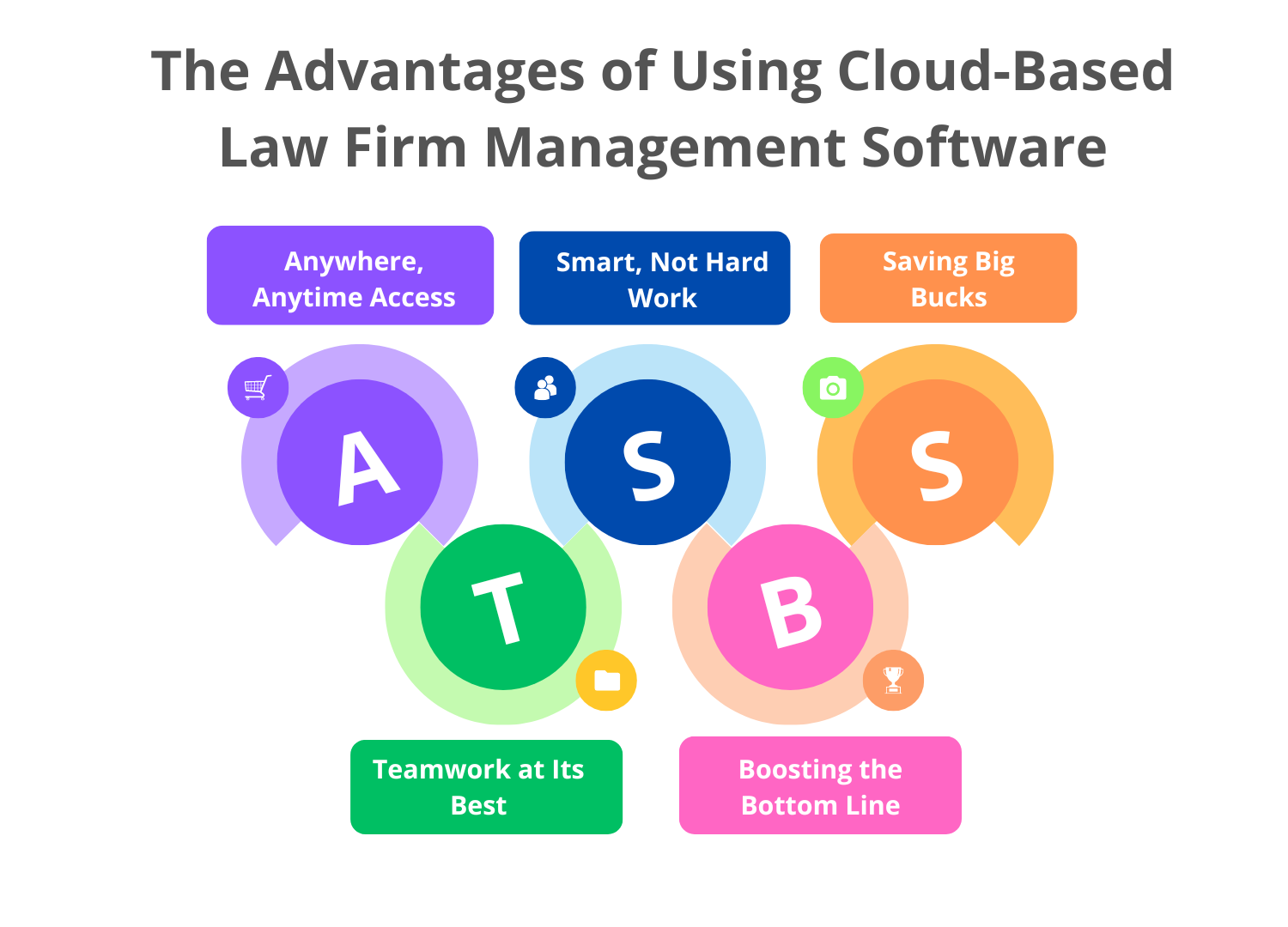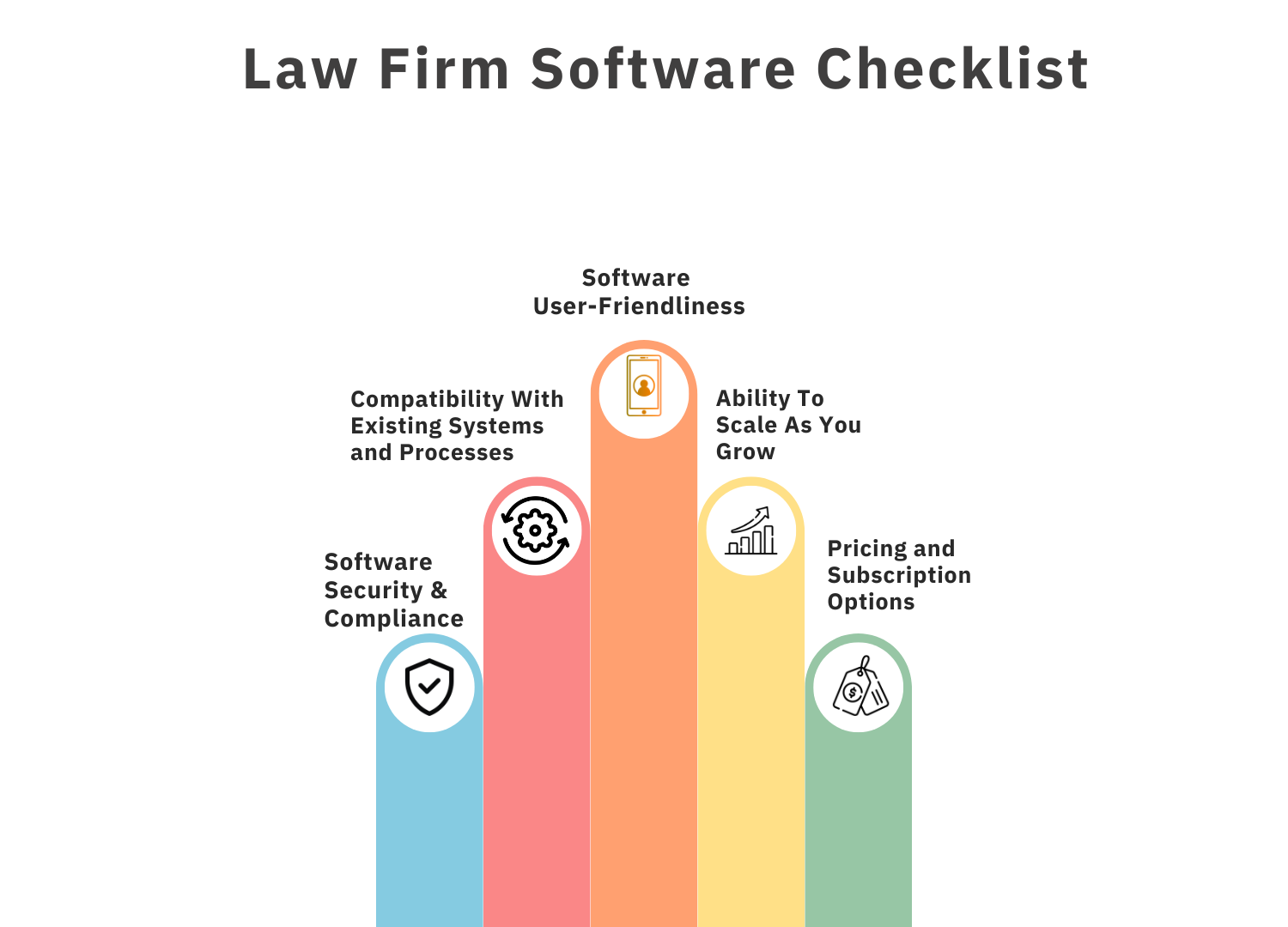Table of Contents
Most likely, you don’t need to hear the statement that the cloud has completely altered again. It has turned nearly every business’s narrative on its head. In this day of technological advancement and modernity, is the legal sector an exception? Legal practitioners are increasingly using legal technology solutions. Specifically, to increase practice productivity, they are embracing legal practice management software. The adoption of technology in the workplace by the legal sector is partly due to the rise in remote work as well as general technological improvements. Although many lawyers are still apprehensive about having all of their private and personal information kept in the cloud, cloud-based applications make it simple to store and retrieve all of their legal documents and client information in one portable device in real time at any place.
With just a few clicks, legal practitioners who were previously overloaded with paperwork can now access and manage case files, contracts, and legal briefs—all safely kept in the digital cloud. In a study conducted it was found that 84% of law firms plan on shifting toward cloud-based legal case management software within the next few years.
Only that organization will survive to tell the story, which rides on the wave of cloud computing. Therefore, it’s worthwhile to investigate cloud-based legal management options; you can do so with the assistance of this site, which is brimming with useful, takeaways.
The Fundamentals of a Cloud-Based Law Firm
A cloud-based law firm can be simply defined as a practice of law that utilizes cloud computing technologies as a means to operate the business. These services include apps that make a practice function more efficiently as well as data storage. Adopting cloud platform technology allows law firms to use apps like attorney accounting software, client communication platforms, and more, as well as store, manage, and process client data and case files located in the cloud.
In the past, these legal practices made use of internal computers and servers. But now, attorneys can access anything online by switching to a cloud-hosted third-party service.
Types of Software for Managing Law Firms on the Cloud
The cloud’s adaptability and flexibility led to the development of numerous legal cloud solutions, each with unique benefits and applications. So, to choose the best Legal Case Management Software for your business with confidence, have a look at our list of the most often used kinds for the legal sector:
Types of cloud-based software for managing law firms
- Software for managing legal practices: a complete platform to automate and simplify routine operations such as gathering clients, setting up meetings and appointments, organizing documents, and more.
- Legal Case Management Software: This Legal Case Management Software helps users handle cases and issues by managing tasks, storing and accessing documents, and organizing case-related data.
- Legal billing software: It aids in the management of trust accounting and spending monitoring. It also helps with billing and invoicing procedures, and financial report creation for legal practitioners.
- Document Management System: This includes the organization, archiving, and retrieval of documents about cases, pleadings, client files, and contracts. This is the main focus of document management systems.
- Client relationship management: CRM, helps with lead processing, real-time communication, client relationship management, and information maintenance.
- Legal research software: Legal research software enables comprehensive research and knowledge development by giving users access to a wide range of legal databases, legal periodicals, case studies, and other resources.
- Trust Accounting Software: To handle customer accounts, keep accurate financial records, and abide by rules and regulations in the sector.

Benefits of Cloud in Legal Practices
To improve the efficiency of legal practice and streamline its processes, the legal sector has embraced technological innovations. Legal cloud-based services management tools stand out among these developments as a game-changer. These technologies provide several benefits to legal businesses looking to improve customer service and workflow. The advantages that cloud-based legal practice management offers to law firms will be discussed in this article.
1. Improved Cooperation and Accessibility
Systems for managing legal practices in the cloud allow lawyers to view their case files and other information at any time and from any location. Businesses with remote workers or those with physical offices find this accessibility to be beneficial. In courtrooms today, attorneys can concentrate on their cases while on the go or even from home. This kind of adaptability helps team members work together more effectively, which boosts productivity.
These cloud-based solutions also make it easier for workers, clients, and attorneys to collaborate easily. They offer safe client portals. Here customers may retrieve files and have efficient communication with their lawyers. They can also receive timely updates on the status of their cases. Ensuring that all parties involved are informed and on the same page throughout the process, helps to minimize burdens and increase client satisfaction.
2. Financial Savings
Small companies can save money using cloud-based legal practice management systems. For storing and managing their data in the past, businesses needed to spend on IT infrastructure, licensing for software, and on-premises servers. They also needed to set aside funds for this infrastructure’s upkeep and improvements.
Small businesses can, however, do away with these expenditures and continuous maintenance costs by utilizing cloud-based solutions. Through a subscription approach, they may safely access their data and only pay for the resources they utilize. Businesses can manage their resources more effectively because of this transition from capital expenditure to spending.
3. Protection and Security of Data
Legal practice management systems hosted in the cloud provide data security priority. Cloud companies put in place security measures to guard against natural disasters, physical theft, and access. These safeguards could consist of firewalls, data encryption, frequent system backups, and strict physical security at their data centers.
Furthermore, access restrictions provided by cloud-based solutions guarantee that only authorized users can access confidential customer data. To provide an extra degree of security and accountability, they also allow businesses to track and audit user activity.
It is a myth that data stored on servers is not necessarily safer than data stored in the cloud. Cloud Services Provider employ groups of security specialists with specialized knowledge in data protection, who work constantly to monitor and update security policies to proactively address new threats.
4. Effective Use of Time and Resources
Cloud-based legal practice management solutions automate time-consuming tasks. This allows for freeing up valuable time for attorneys and staff. Features like document management, time tracking, billing, scheduling, and client communication tools are all integrated into these systems. Smaller companies can focus on providing legal services to their clients and lessen their workloads by automating and streamlining these operations.
Moreover, cloud-based services do away with the necessity for duplicate and data entering. Attorneys and staff only need to enter data once, and it will be immediately updated in all databases and documents. By doing this, you may reduce errors, assure data correctness, and manage different information sources more efficiently.
5. Flexibility and Scalability
Scalability is demonstrated via cloud-based legal practice management systems, which can adapt to changing company requirements. Cloud-based services can easily accommodate an increase in users, storage capacity, or functionality as a business grows. Businesses may meet increasing demands thanks to this scalability without having to make investments in new software or hardware.
Software update flexibility is another benefit of cloud-based systems. By smoothly handling updates and integrating with tools, the cloud provider guarantees that businesses always have access to the latest features and security improvements. Additionally, cloud-based services frequently interface with field-used software and apps, enhancing productivity and facilitating workflow integration.
6. Automation
There’s a good chance that your cloud-based practice management system will let you automate some processes. This can include lead gathering, scheduling, document management and automation, task management, and even a cutting-edge client portal that makes it simple for clients of your company to upload, download, and retrieve case files or pay payments.
You can stop wasting time and energy on tedious procedures and concentrate on the law by automating your practice with an LPM. Additionally, you spare your clients the headache of having to worry about bills and files on their end becoming mixed up with all of your other documents—digital or physical. You may increase productivity and expedite payment processing even further by integrating your legal practice management platform with your accounting, invoicing, and payment software.
Better Integration of Software
When using traditional on-premises legal cloud solutions, integrating numerous software stacks can be a difficult effort. Software designs for cloud management facilitate easy integration.
If it is conceivable at all to integrate other software solutions with on-premise software, it might be a challenging process that takes time and money. On the other hand, cloud-based software companies create programs that streamline this procedure and let you link to other programs you are already familiar with (Microsoft Office 365, Google Calendar, SharePoint, etc.).
Control Legal Spend by Implementing Technology Solutions in Your Legal Operations
Safety Tips You Need to Consider
Even if cloud-based technology is more secure than on-premise systems, with cloud migration, legal businesses must give data security and privacy top priority. For a safe transfer, take into account these safety suggestions:
Examine the security credentials of cloud service providers.
Prioritizing security is crucial while assessing possible cloud service providers. When completing due diligence, look into the security credentials and certifications of possible providers and select one that complies with industry best practices and legal standards, like encryption techniques and access controls.
Assure Data Encryption for Storage and Transfer
To reduce data breaches and cyberattacks, data encryption converts your data into an unreadable state. Make sure the supplier you choose encrypts critical data both during storage and transit to guard against unwanted access.
Put Strict Access Control Measures in Place
Not every employee should have access to every document after moving it to the cloud migration. Use strong access control methods to safeguard your data. Including role-based access control, which limits access to a user’s data according to their function within your company.
Backup your data often to a secure location
Make sure to arrange regular automated backups to a secure location because data loss can hinder productivity and harm your company’s reputation. In that manner, in the event of a hardware malfunction or corrupted data, you’ll be able to rapidly resume operations.
Select Suppliers with a History of Dependable Uptime
Uptime is important to the smooth running of your legal practice, so service outages aren’t something to be tolerated. Service level agreements, uptime guarantees, and past performance have to be taken into consideration when looking at providers.
Recognize and abide by data privacy laws
Be sure you understand legislation like the General Data Protection Regulation. Keep in mind that state-by-state variations may exist in data privacy laws. Stay aware of legislative developments in this ever-evolving field to guarantee compliance and safeguard client confidentiality.
For all accounts, use two-factor authentication
You want to log in with more than one password to secure your information. Set up two-factor authentication. Without this, it will be impossible to log in without the second form of identification. It can be a fingerprint scan or a one-time passcode.

How to Select the Best Software for Cloud-Based Law Firm Management
To get the most out of your investment, you should select the best legal practice management software available, despite the wide range of solutions available.
To achieve that, choose your product by using these tried-and-true methods:
1. Assess your present needs.
You must first determine the objectives and areas of suffering for your legal practice. Do you want to manage documents more effectively? Do you have any tech gaps to fill? Are there any daily, manual jobs that you can automate? You can begin your software search as soon as you’re prepared with the fundamental examination.
2 Do Your Research and Select a Trustworthy Service Provider
It’s time to investigate the tech scene. Examine the portfolios, reviews, case studies, and previous projects of several cloud software development businesses by conducting in-depth research on them.
In the end, you want to work with a legal software development partner who is well-versed in cloud computing and who shares your goals for long-term expansion and needs.
3 Search for Options for Customization
Nothing here is one-size-fits-all. Look for a customizable cloud-based solution for law firms. The software should take into account your particular workflows, as your firm has specific requirements.
Software should be flexible enough to adapt to changes when you grow your business, add more employees, or scale up your operations.
4 Carry out Integration and Data Migration
This stage of the deployment of cloud-based legal management software is crucial. You must carefully and securely move the copious amounts of data your law company handles about clients, contracts, and case files to the new cloud platform.
To minimize clutter and guarantee a smooth move, make sure you clean and consolidate data before moving. A smooth process often requires connection with other technologies, such as accounting or CRM programs.
5 Instruction and Execution
At last, you can present the software to your legal counsel. To ensure that everyone feels at ease with the change, conduct thorough training sessions on the new system’s features, operation, and use.
For overall performance improvement, you may also need to make a few small software adjustments based on your team’s input and experience.
Challenges to Adopting Cloud-Based Management in Legal Practices
1. Protection of Private Client Information
Many of the law firms contain private client information giving up such sensitive information would be cause for concern for any legal executive, as law firms are mandated by their clients to maintain the privacy of their clientele and cases.
Make sure the supplier you select matches your cloud security requirements and has a stellar reputation to safeguard your company. Make sure to ask pertinent questions of your supplier, emphasizing security protocols and data privacy laws. Many people are shocked to hear that even while providers host their infrastructure and data, they are unable to access it. It’s similar to giving kids a book to look after and keep, but locking it so they can’t turn the pages. Making use of a reliable cloud service provider gives your company security benefits that are unlikely to be available in-house for most law firms.
2. Regulations Regarding Data Privacy
Legal practitioners have long been hesitant to migrate to the cloud, with particular worries around data privacy laws at the heart of their reluctance. Many nations have passed rules controlling cloud computing and information sharing over time. Be sure to discuss any concerns you may have with your cloud service provider. Certain jurisdictions may have restrictions on the kinds of data that can leave the country, and other regions may have ethical standards regarding the use of the cloud that, if not followed, could harm an organization’s reputation.
You must first be informed about the regulations that are in effect if your company is worried about adhering to the regulatory standards unique to your jurisdiction. Understanding the legal prerequisites is a crucial first step for cloud security. Your supplier should be willing to collaborate with you to make sure you’re fulfilling your responsibilities and offer knowledgeable guidance.
3. Fear of Handing Over Control
For the majority of firms, turning over vital business apps and data is a big concern. Many worry that they won’t have control if they host their data somewhere else.
Talk to your possible supplier about your worries; the discussion should cover these issues as well as how all parties involved can share control while yet having strict scrutiny. By distributing management of your cloud platform, you free up your IT staff to work on projects that drive innovation and advance the company. Together with your provider, you may create a plan that takes these issues into account while still giving you the degree of control you need.
See The Difference Technology Can Bring To Your Law Firm
Conclusion
Perhaps your staff members would like easier access to their work. Perhaps you want your strong security standards to make your clients feel more at ease and confident in your legal practice. Perhaps automating your procedures will help you in your work. Perhaps all you want to do is save money. For any reason, acquiring Cloud-based legal management software can help your business grow and succeed in the long run.
For law firms, cloud-based legal practice management solutions have several advantages. These consist of scalability, cost-effectiveness, data security, accessibility, and effective use of time and resources. Small businesses can improve teamwork, streamline processes, and provide excellent client service by utilizing this technology. Cloud-based legal practice management solutions will become a tool for businesses looking to stay competitive in an increasingly digital world as the legal sector continues to change.
FAQs
What is software for managing legal practices?
A comprehensive system called legal practice management software aids legal practices in running their daily operations and workflows. A law firm’s cases, contacts, calendars, paperwork, tasks, time tracking, billing, payments, accounting, and more may all be managed with the use of this kind of software.
How to encourage staff to use the legal practice management software?
Change management is controllable with the appropriate preparation. Provide ample notice before changing equipment, communicate effectively, fund training, and make it obvious how the change will facilitate employees’ daily tasks.
What features should a legal practice management software have?
Billing, case management, and document management should be included in good law practice management software should include. Additionally, check for endorsements and reviews.
When should a law firm use practice management software?
Practice management software is typically worth the price because it helps prevent calendaring or administrative errors that could endanger your organization. If you are managing your practice with many tools, think about whether you could operate more effectively from a single central platform.





